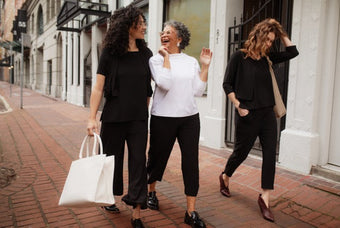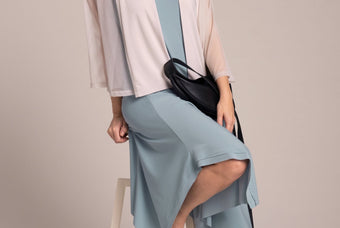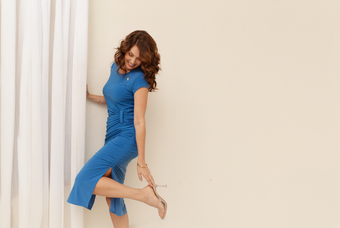How I healed my relationship with food and body image and realized a lifelong dream of launching a successful modeling career in my late 50s.
Q: For many, sharing their eating disorder recovery/self-love journey story can be therapeutic and healing and can inspire others to share their story as well. Can you tell us a bit about your personal recovery journey and what motivated you to open up about it?
A: My recovery began when I decided to leave a verbally abusive toxic first marriage. Always a pleaser and one to avoid conflict, I took a very bold step in leaving. At my lowest I found the strength to walk away. Eventually, I started putting myself first, started to realize I was worthy of more, was worthy of abundance and most importantly worthy of love. This began to open up my capacity to love myself and to also extend my love to those close to me. I decided to embrace cooking and the joy of community in “breaking bread” with family and friends. I tried to make food an ally. It became an opportunity to experiment and to create and share the results with my loved ones. The kitchen became a happy place instead of a place of threat. Surprisingly, I wasn’t overeating or abusing food. With an open book to experiment and create different dishes I lost the urge to overeat. While in my mind I felt I had stopped abusing food, I was still identifying as a person with an eating disorder, constantly looking over my shoulder, thinking this was all too good to be true. I continued to criticize my body size and shape and made exercise a priority to offset any consumption of food.
After the sudden and unexpected passing of my sister I finally decided to reach out for professional help. The loss of her life affected me profoundly and with the harsh reality of her not waking up to a brand new day, I felt a gauntlet had been tossed to me, and it was time to figure things out, to once and for all deal with the emotional issues masked behind the fixation with food. I worked through a recovery program which made me dig deeply into the emotional side of my eating disorder. I had to learn to stop identifying as a person with an eating disorder and start identifying as a person of worth, of beauty, of uniqueness, perfectly imperfect.
This hard work led to a pivotal point in my life…..where I was figuring out what was eating me instead of fixating on what I was eating.
Reframing my thoughts and identity, at the age of 57, I opened up room for vulnerability and courage in realizing a life-long dream and launched a new career as a lifestyle model.
At my heaviest weight and at an age where most people are retiring, I walked through a wall of fear and the unknown, no longer a person with an eating disorder, but as a person of worth.
My physical appearance was no longer my adversary, but the tool, the vessel, through which to achieve my dream. Many people wanted to know my story, how I had rewired and reinvented myself at midlife.
In sharing my story of realizing a life-long dream to be a model I had to not only tell the story of the emotional abuse I had overcome, but also tell the story of the self-inflicted abuse of disordered eating. I had never before told a soul about my bulimia, I had never shared the shame with anyone. On the outside, I appeared to have my act together, happy and well-adjusted, which was a façade of defense in protecting myself from revealing my truth.
Once I began telling my story, the eating disorder no longer had power over me. The burden was cast off and my defensive shield was lowered.
Q: Reflecting back on your journey, are there any words of wisdom or reflections you’d like to share with those who are just starting on their road to eating disorder recovery?
A: Stop identifying as someone with an eating disorder. Redefine your identity as someone of beauty and talent, worthy of love and abundance. Reach out for professional help such as the Looking Glass Foundation. Talk to someone you trust and tell your story. By being vulnerable and talking about your recovery journey the disorder loses its power. Back away from toxic people and relationships. Remove yourself from social media messages that trigger disordered eating and body shaming. Join a social media support group to help you through your recovery.
The biggest regret I have is pretending everything was okay and not opening up about my bulimia. I thought I could fix this problem on my own. If I could just be on a diet and not binge and purge I’d be alright. I would reset and start again, follow the diet, exercise for hours every day, but invariably, I’d binge, and the enormous guilt led me to purge and then the vicious cycle continued.
I felt so much shame and felt everyone would pass judgement on my mental illness. In reality, I was so wrong. There are people who care and people who don’t pass judgement, who see beyond the stigma. In my experience, aside from professional help, daily journaling centering upon gratitude helps me immensely.
Q: Self-love journey is rarely linear, and it’s expected to be met with setbacks and relapses along the way. In fact, part of the process is to embrace the unknowns and use setbacks as an opportunity to learn and grow. What were some challenges you faced during your recovery and how did you overcome them?
A: The greatest challenge for me was to stop identifying as a person with an eating disorder. I needed to stop using it an excuse for self-limiting thoughts and expectations to prevail. Language holds great power and I had to turn that power to my benefit. It was a challenge for me to grasp that I am right where I am supposed to be at this moment. Our greatest power over our thoughts and our identity are in the here and now. Not in the past, not in what we may be in the future.
Throughout my journey, if my self- esteem gets low, fear and anxiety take hold and I start to feel helpless and worthless. In this lonely, dark space food was always the drug of choice in suppressing the pain. Through frequent journaling I am able to unload thoughts and emotions before they look to food for release. Learning to identify the emotion behind the food diffuses setbacks. With my first waking thoughts I express gratitude for the gift of a new day. With my final thoughts before I go to sleep, I express gratitude for all that was given to me in that day. Stopping to recalibrate in the present moment gives me clarity in choosing how I frame my thinking and emotions.
Through recovery I have learned to avoid triggers that sabotage a healthy relationship with food and body image. I set safe boundaries around toxic people and use social media as a means to empower myself and others. I don’t weigh myself and refuse to give a number the power to affect my mood for the day. I stay away from any diet or exercise regime that is a short term fix and is unsustainable long-term. I have learned to eat and exercise intuitively, working with my body not against her by setting extreme measures.
I am in a life-long relationship with food and with my body. It is not one sided. I need to listen to her and treat her with the respect she deserves which includes making healthy food choices and exercising her in way that is of benefit to her.
With this balance in mind, and with gratitude firmly planted, I am able to maintain a long-term lifestyle, rather than jumping from one short-term fix to another which are set up for failure as they are not sustainable.

Q: Reaching out for help isn’t always easy but it is so important, and it can often be a huge relief to open up to someone. Where and how did you reach out for support? Are there any resources you found helpful along the way?
A: The turning point for me in realizing I needed to fully heal my relationship with food and body image once and for all was reading a book called The Goddess Revolution by Mel Wells. In this book she takes a deep look at the toxicity of an image driven society, diet culture and extreme exercise programs. Food and diets are not the issue, but rather the emotion and psychological issues behind the food. In order to heal, you must feel!!
Her message struck a chord in me as I realized that my fixation with diet and exercise was a façade for personal, deep psychological and emotional issues stemming from years of emotional abuse in my first marriage. Will power alone was not going to heal my relationship with food and body image.
I took the time to let my body tell me when it was hungry and to identify the emotion behind the sensation to eat. Was it hunger or was it filling an emotional void? No foods are off limits. No restrictive scheduling. No scales. And, you know what? I didn’t gain a bunch of weight. I didn’t sit and eat sugar and carbs day and night. I intuitively learned to nourish my body with good healthy food because that’s what fuels her and makes her feel good.
I have also learned that, every once in a while, she loves the pleasure of indulgent food and if it’s overdone, she lets me know she doesn’t feel very well. She doesn’t like too much sugar or too much fat or too much alcohol. She loves to play outdoors, swim, golf, ski, skate, walk, hike….you get the picture? I treat her as my best friend. In order for us to live in harmony there has to be a common sense, flexible plan in place and for us it is intuitive eating and exercise. At midlife, nutrition and exercise are of great importance to me and I take time to stay abreast of valuable information, but not obsess about it.
Q: How do you practice self-care? Any tips for others on how to find a self-care routine that works best for them?
A: I begin and end each and every day with thoughts of gratitude. Even in the middle of the night when I can’t sleep I practice gratitude. I make my daily walks with mindful meditation and journaling a priority. I incorporate strength training and flexibility, but not obsessively. Balance and moderation are key words in my self-care vocabulary. I say no to people and tasks that are too much for me. I set aside space to create. Painting and writing are very important to me. Spending quality time with family and friends fills my love tank. If I wake up and I really don’t feel like walking or exercising, (which is rare) it is okay. If I choose to eat a cookie or a bag of chips, it is okay. If I choose to say no to a job, it is okay. It is okay to stop and rest along the journey. I am beyond trying to prove I have willpower. I know I have willpower. I hid a secret for decades. That takes will power. I put the power of my freedom to choice first and with that come grace- the grace to forgive and move forward. To me, this is the most valuable self-love act I can give myself.

The Sympli Brand is a perfect “fit” for me. Sympli views personal style as the art of self-expression. We are all unique and Sympli embodies that idea in its designs. Who says you have to play by the rules? We are constantly evolving as women, not playing by the rules. I stand with Sympli in saying to the world, “This is me! Timeless with a bit of an edge.”
I am empowered by Sympli’s Canadian founder who set out to create clothes to inspire women of all ages and body types to be their most confident, most inspired selves. In my opinion, comfort equals confidence. In your skin, in your clothes. In a few days I will turn 60 years old. It’s freeing to explore this life I’ve created, to reinvent the rules to suit my personality. Sympli’s mission supports me in this pursuit.
I applaud the partnership Sympli has established with The Looking Glass Foundation which supports individuals struggling with eating disorders through innovative and accessible programs and services that decrease isolation, instill hope, and sustain recovery. This cause is near and dear to my heart. I can’t stress enough how important it is to have access to
a Foundation that is aware of the harsh realities of eating disorders, the stigma that exists around this mental illness, and the work that still needs to be done in addressing treatment access and gaps. All of their work is grounded in hope, compassion, accessibility and accountability. Knowing this, they continue the fight against eating disorders, while sharing the message that recovery is possible.
They understand the journey and they are here to help.
The Looking Glass Foundation can be reached by:
Phone: 604-314-0548
Email: info@lookingglassbc.com
Website: www.lookingglassbc.com
Thank you Barbie Holmes for sharing your beautiful story that inspires all women.
Instagram: www.instagram.com/barbieholmes








